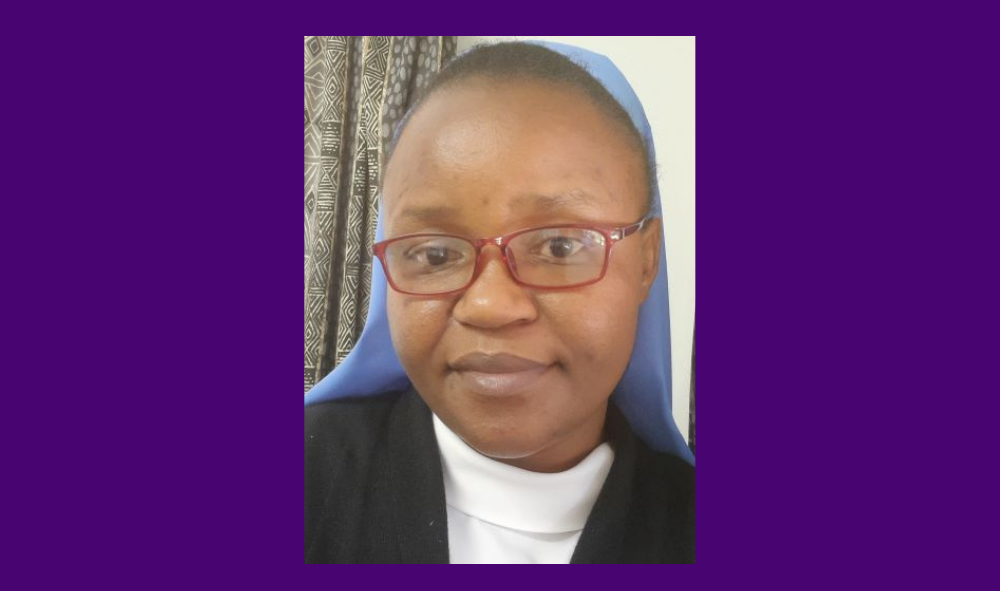
Carmelite Sr. Yvonne Sanyanga is a certified counseling psychologist who works with seminarians and lay people amid Zimbabwe's socioeconomic hardships and a shortage of mental health professionals. (Courtesy of Yvonne Sanyanga)
Carmelite Sr. Yvonne Sanyanga is a certified counseling psychologist who conducts workshops and counseling sessions for seminarians and lay people in Zimbabwe. The country's socioeconomic hardships are increasing mental health challenges for many and there is a shortage of mental health professionals, making Sanyanga's apostolate a necessary service.
She also lectures trainee priests at Arrupe Jesuit University in Harare, the capital, where she helps seminarians prepare for and navigate their call to the priesthood. She spoke to Global Sisters Report about her work as a certified counseling psychologist.
GSR: How did your work in your apostolate as a certified counseling psychologist start?
Sanyanga: I believe it is inborn. I have been passionate about listening and attending to the emotional needs of others [since I was young].
Joining religious life, I suppose, was also inspired by the same inclination. God directed me towards this profession through the wisdom of my prioress general, who recommended this course [of study].
The zeal was further fueled by the different mentors I encountered during my studies, and I am still encountering as a practicing counseling psychologist.
As a certified counseling psychologist [and] Catholic nun, I combine two significant and complementary aspects of my identity: psychological expertise and a deep religious vocation.
I approach counseling holistically, integrating psychological methods and spiritual care in the context of my professional regulations. I help people from all walks of life with mental health-related challenges.
What kinds of people are you assisting?
As a counseling psychologist, I work with clients from diverse backgrounds who face various challenges. These include adjustment issues, depression, stress, suicidal ideations/attempts, substance abuse, grief, trauma, identity crisis issues, relationship challenges, family issues and other challenges that could require the intervention of a therapist.
You also lecture at Arrupe Jesuit University. What have you found most challenging and fulfilling about teaching the next generation of priests and other professionals?
Navigating the students' diverse needs and learning styles while trying to foster critical thinking and resilience in this rapidly changing world.
The most fulfilling part of this work is witnessing student growth and transformation, seeing them develop their skills, and knowing that I am contributing to the future of their professional dreams.
It is extremely rewarding when students apply what they have learned to make a real-world impact.
I recently conducted a workshop after an invitation from Fr. Mobie Musakatiza, a priest who accompanies the seminarians in their journey of discerning the priesthood within the Archdiocese of Harare. While they depend on the church for their welfare, they still need economic, social, emotional and spiritual support.
Young people are the backbone of the church, but many in Zimbabwe are affected by socioeconomic issues that are driving them to drugs and away from the church. How can young people be assisted or encouraged to stay in the church and away from drugs?
I would suggest creating supportive environments within the church and organizing youth-friendly programs, such as mentorship programs, community service projects, and recreational activities that promote positive relationships.
These resources encourage critical thinking about faith, beliefs, and social pressures, and enable the youth to navigate peer influence thoughtfully and remain guided in their faith journey amidst contemporary confusion.
Advertisement
I would recommend individual professional counseling services, where young people can be helped to process issues they face at personal, familial and church levels. Group therapy can also create a communal support system where they feel understood and less isolated.
Life skills training programs such as financial literacy, job readiness, relationship building and conflict resolution can empower the youths to navigate their socioeconomic challenges more effectively.
A strong focus on doctrine over personal experience and spirituality can be discouraging, especially for those seeking a more personal connection to faith. Relevant and practical teachings integrating contemporary issues within sermons can keep the youths committed to the church.
Additionally, acknowledging negative experiences that family members may have had with the church can create safe spaces for discussions, provide counseling resources, or encourage restorative practices to heal from past wounds that can inhibit the youths from remaining in the church.
There are not many Catholic sisters doing this work. What is your advice for younger Catholic sisters pursuing this apostolate?
The study of psychology is a vital program for a religious sister because it enhances understanding of human behavior, improves listening skills and com
passion, supports spiritual guidance and broadens outreach potential.
If more religious sisters embrace this discipline, meaningful contributions could be made toward the well-being of individuals and communities within and outside the church.
What activities do you enjoy outside your professional work as a counseling psychologist and lecturer?
I enjoy a variety of activities that help me unwind and rejuvenate. These include reading motivational books, researching, writing and publishing articles, traveling, taking nature walks, watching movies and meditation.





